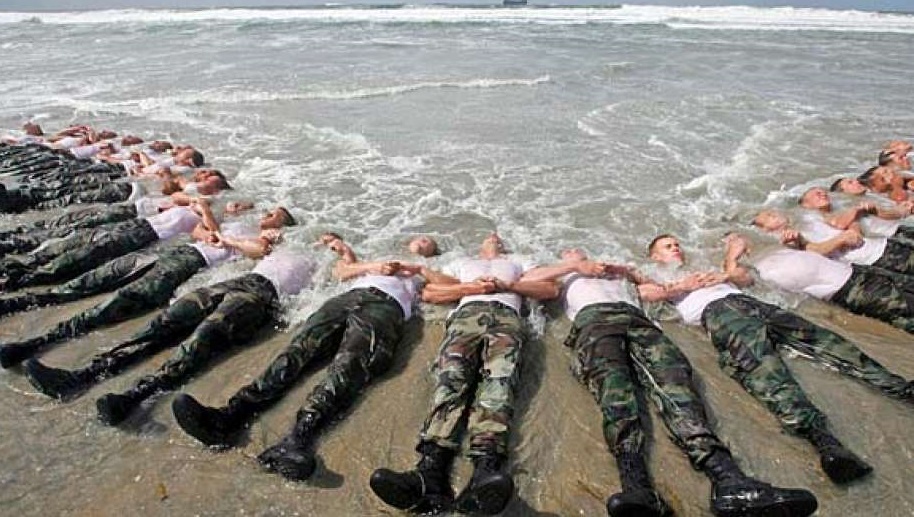
Of the 135 men that started, we had dwindled to just under 40. At the current moment, it was hard to tell exactly how many people were left in the chaos that was upon us.
The day before, we had started hell week, often regarded as the most difficult military training in the world. Students receive a total of four hours of sleep throughout the entire process of 5.5 days of continuous training. Ultimately, we would finish with 20 men.
On this particular night, we were in teams and raced about 5 miles down the beach carrying boats on our heads. It was a race that you did not want to lose. The winning team received a small break to sit and huddle together for body warmth while the losers were pounded without mercy for their failure.
We left our boats and raced back to the compound to retrieve our logs. Same process for the winner and the losers. We raced carrying our logs 5 miles back to where we left our boats. We were wet, cold, and covered with sand the entire time.
Next we raced in our boats, paddling them through the unforgiving west coast surf zone. The surf would often throw boats backwards, launching students into the air and splashing them into the frigid water before tumbling them end over end, engulfed by what felt like a freezing cold saltwater washing machine.
However, our biggest fear was not injury, hypothermia, or even losing the race. Our biggest fear was losing grip of our paddle or separating more than 6 feet away from our swim buddy. These infractions were deemed almost unforgivable by the instructor staff. Your paddle represents your weapon, and your teammates are your strength. Without either of them, you have little to no chance of survival.
We would pay for every infraction regardless of how minor it may have seemed and every failure to win first place. However, our odds of winning races were increasing, because enough men had quit the training to put us at just 3 boat crews.
In darkness, but with the sun starting to crack the horizon, we started rock portage. I’ll admit it: I was scared. It was one of our more dangerous evolutions as we landed our rubber boats on a large, jagged rock jetty and carried them across to the other side trying to carry our weight, while also trying to keep the breakers from pummeling us into a rock or losing our footing and falling on the slippery hard surface.
Then came surf torture. Surf torture is simple. Lay on your back in cold water keeping your arms locked onto your teammates’. The cold water and intensity from the staff felt relentless and men began breaking the chain to get up and quit. The bell was in the back of a truck with a line of students waiting to ring it. The beginning stages of hypothermia broke the will of many very good and exhausted men who had already endured 4 weeks of intense training prior to that night.
We were crawling along the beach, and I was struggling. It was coming down on us hard. As I looked up, I caught eye contact with one of our most talented guys. Although he was talented, I had also witnessed him make fun of his teammates when things got hard. I had heard him blame his teammates. I had heard him play the victim. I had listened to him taunt classmates, and I had also watched him perform very well. He was strong and fast and crying as he walked over to the bell to quit.
I had some empathy, but there was no helping him. He had made his decision. Plus, I didn’t want him to go to war with us. Why? Why wouldn’t we want our best performer to go to war with us? What is the need for such training where top performers may bail?
Because talent is worthless when it runs away. Character is priceless when it’s time to hold the line. A lesson that would later prove itself true countless times over. Never sacrifice character for talent. Talent without character can be successful, but this isn’t about being successful. This is about being elite. Consistently elite.
Elite teams start with the right people. Hell week is our funnel. A team cannot work to full effect without it. You won’t have trust. You won’t be able to empower leadership. The team will crumble in adversity rather than bond.
The same happens in baseball. Talent can take you to the status quo, but reaching your next level requires adversity. The adverse situations is where you will see your talent become self absorbed. They’ll run their mouth to cover for fear and lose their composure. They’ll fail and blame it on you.
These are also the situations where you will see players with character hold the line. They’ll fight relentlessly for each other and leave the media pundits wondering how it happened as they dog pile on someone else’s field.
Teams with great chemistry are just a collection of good dudes. That’s all it is. In addition to talent, the recruitment and selection processes must have a funnel to evaluate character. Go find some good dudes that love and are great at playing baseball. It’s how winning is done and it pays to be a winner.
Jason is a former Navy SEAL Sniper and NCAA Division I baseball player. To have Jason work with your team email [email protected]. For more information on Jason’s team training services visit www.stonewall-solutions.com.